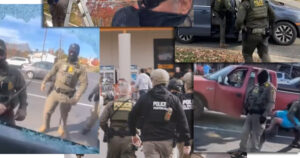 Charlotte is on edge as it enters day 6 of the US Border Patrol’s unprecedented “Operation Charlotte’s Web”.
Charlotte is on edge as it enters day 6 of the US Border Patrol’s unprecedented “Operation Charlotte’s Web”.
The federal operation, carried out without coordination with local law enforcement or Immigration and Customs Enforcement (ICE), marks the first large-scale border enforcement raid of its kind in US history.
Numerous detained and released residents say agents did not read Miranda rights, demanded identification on private property, and detained individuals solely for speaking Spanish or having Latin features.
Charlotte leaders are now calling for transparency from federal officials.
The ripple effect has been severe
Charlotte-Mecklenburg Schools confirmed that nearly 21,000 students — about one-third of all Hispanic students — were absent on Monday. CMS acknowledged families were afraid to send children to school amid large-scale detentions occurring in public spaces and residential neighborhoods.
Hundreds of Latino-owned businesses and restaurants temporarily closed their doors. Churches postponed Sunday services. Community leaders warn that many families of US citizens have gone into hiding, fearful of being “disappeared” after witnessing agents detain people without providing names, charges, or clear documentation.
Local Organizations Step Forward as Families Seek Help
In the midst of the chaos, Charlotte’s Latin and immigrant support networks are mobilizing to assist families, offer legal help, and keep vital services running.
These local organizations, ranked by overall size and funding, are now on the front lines:
1. Camino (Camino Community Center)
Charlotte’s largest immigrant-serving nonprofit is expanding its legal aid clinics, mental health counseling, emergency food support, and medical assistance. Camino has opened additional walk-in hours for families seeking help or clarification about federal enforcement activity.
2. Catholic Charities — Charlotte Region
A major provider of immigration legal services, Catholic Charities is assisting families with citizenship documentation, emergency support, and rapid-response legal guidance. Caseworkers report record call volumes.
3. Project 658
This Charlotte-based organization is providing safe spaces, English classes, counseling, and youth support for refugee and immigrant families suddenly fearful to leave their homes. Staff are conducting wellness checks and distributing fresh food and supplies.
4. Latin American Coalition (LAC)
LAC has activated its Immigrant Welcome Center and is documenting incidents of racial profiling. The coalition continues offering legal clinics, community alerts, and crisis navigation support.
International House is supporting newly arrived immigrants, long-term residents, and mixed-status families through citizenship classes, legal referrals, and multilingual assistance for those afraid of interacting with authorities.
Serving hundreds of immigrant children daily, ourBRIDGE is coordinating transportation, after-school support, and outreach to families too afraid to attend school. Staff report a major rise in fear among elementary and middle school students.
The Federation is deploying emergency grants to Latino-owned businesses forced to temporarily close and is coordinating statewide advocacy in response to civil liberties concerns.
Enlace is publishing bilingual updates, fact-checking rumors, and reporting on constitutional issues linked to Operation Charlotte’s Web. Their journalism team has become a key source of accurate information for frightened families.
9. LAWA (Latin Americans Working for Achievement)
LAWA is supporting Latino high school and college students whose families are afraid to send them to campus. The group continues academic mentoring and emergency family assistance.
10. Enlace Charlotte
This grassroots network is distributing food, sharing legal resources, and coordinating neighborhood volunteers to check on elderly residents and single-parent households.
How Charlotte Can Support Its Latin Community
Community leaders stress that local action matters, especially as federal activity continues.
Residents can help by:
- Supporting the above organizations through donations or volunteering
- Sharing verified updates and legal resources with neighbors
- Visiting Latino-owned businesses impacted by closures
- Reporting unlawful actions by federal agents
- Checking on families who may be afraid to travel or seek services
- Encouraging attendance at school by helping reassure parents
Charlotte is home to more than 200,000 Hispanic and Latino residents, forming one of the fastest-growing communities in the Southeast. Leaders warn that Operation Charlotte’s Web has eroded trust and stability overnight — but the city still has the opportunity to come together and protect its most vulnerable families.
As “Operation Charlotte’s Web” continues for an indefinite period of time, Charlotte Stories will continue tracking developments and providing updates as community organizations respond to this unprecedented moment in the city’s history.


